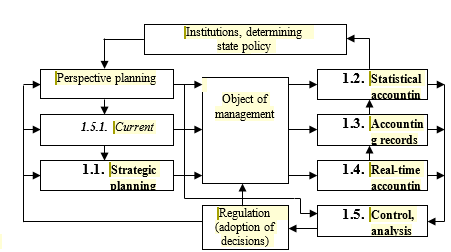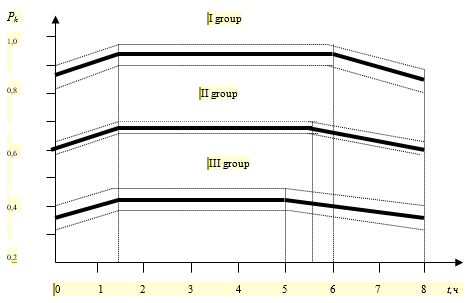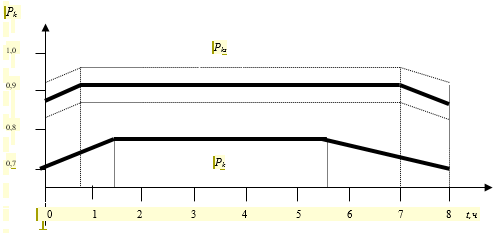Abstract
In current conditions management approaches are implemented at various levels of the agro-industrial complex, the aggregate of agricultural producers has to be considered as open systems. In this case, the problems and tasks of its strategic management are focused but not the management of production and economic activity. The implementation of this issue requires a deeper preparation of necessary managerial decisions. Here, it is reasonable to use intellectual methods of information processing. The article presents a conceptual approach to the construction of a real-time expert system for effective management decisions by the head of an agricultural enterprise. The study of the article shows the results of the quantitative experiment of quality assessment in the activity of a decision maker (DM) in a livestock enterprise. This allowed ranking the managers according to their psychophysiological features and to build the appropriate graph. The study of the simulation model made it possible to assess the impact of ineffective functioning of dairy farm subsystems on milk yield (so a 40% decrease in DM’s quality results in a 34.1% decrease in milk yield). Decision Support System (DSS) gave an opportunity to improve DM’s efficiency. As the Decision Support System it seems reliable to apply a real time expert system due to uncertain factors in the objectives of decision-making of an agricultural enterprise. The experiments were conducted during the working shift for three formed groups of DMs. Some results of the experiments are given in the article.
Keywords: Agricultural enterpriseintellectual analysisreal time expert system
Introduction
In statistical reports, the term "agricultural producer" or, less frequently, "agricultural enterprise" is used to refer to existing types of production units in agriculture. Until recently, in the scientific literature on management methods in the structure of agrarian-industrial complex (AIC), agricultural enterprises and organizations were considered as closed systems, with fixed values of inputs and outputs. At this view on the problem management tasks were built on classical approaches to their solutions and basically resulted in the management of enterprise activity (Podinovskaya & Podinovsky, 2014; Shepel, & Akimov, 2015). In this case, the management problems of the system as a whole were carried out from a higher level of management (as can be seen from Figure

Source: authors.
Problem Statement
Any production or business manager has to make various management decisions every day. Most often, in agriculture the optimality of decisions is not raised, but sooner or later, due to certain circumstances, the manager faces the problem of their scientific justification. The article highlights the fact that there is a fairly wide range of managerial decisions made in situations that can be structurally disassembled into components and traced, so some links and dependencies between them will be established and then it is possible to describe the existing situation on this basis (Mesjasz-Lech, 2014; Orlov, 2011). If the result can be formalized, it can be written down in mathematical form, thus presenting a mathematical model of the situation. At present, among the most fruitful and efficient methods of scientific knowledge of large systems is intellectual analysis. Due to the peculiarities of agricultural production and the problems that have to be solved this method is used very rarely in the synthesis and formalization of processes in the agricultural sector. However, its wide opportunities in this area will give a very high result.
Research Questions
1.Evaluation of the DM’s efficiency of livestock enterprises.
2.Evaluation of the influence of inefficient operation of farm subsystems on milk yield.
3.Building a Decision Support System (DSS) for the head of a livestock enterprise.
4.Evaluation of DM’s efficiency of a livestock enterprise including the DSS.
5.Allocation of working groups in order to carry out quality expert work.
6.Expert evaluation for the creation of criteria to assess the work performance of livestock enterprise managers.
7.Processing and interpretation of the obtained results of the experiment.
Purpose of the Study
The aim of the study is mainly to search, adapt and apply new knowledge in the field of artificial intelligence to improve the efficiency of agricultural enterprises of animal breeding specialization.
So the objectives can be generalized in the following way:
-to study the possibilities to improve the efficiency of a livestock enterprise using the real-time expert system (RTES);
-to study the expediency of using RTES by decision makers with different psychophysiological features;
-to choose methods of formalization of decision making tasks;
-to define an approach to create working groups to conduct expert examinations;
-to justify the technical support for conducting research;
-to develop methods for processing and interpretation of the results.
Research Methods
The conducted experiment made it possible to quantitatively estimate criteria of heads’ work performance of livestock enterprises within 8 hour working day. The managers of the enterprises were ranked depending on psychophysiological features. Managers with high marks were ranked in the first group, with average marks in the second group and with low marks in the third group. Figure
The calculations were performed on the developed simulation model (Shepel et al., 2019). The machine experiment allowed studying the behavior of the researched imitation model of Mim dairy farm (F) on the interval of time, which was chosen equal to the duration of lactation of Tl cow. The study shows that a 10% decrease in DM’s quality leads to a 5% decrease in milk yield; a 20% decrease in DM’s quality leads to a 9.66% decrease in milk yield; a 30% decrease in DM’s quality leads to a 22.3% decrease in milk yield; a 40% decrease in DM’s quality leads to a 34.1% decrease in milk yield. The impact of inefficient operation of subsystems of feed preparation and feeding (FPF), water supply (WS), animal care (AC), obtaining and processing of animal products (OPAP) and transportation (TR) on milk yield were calculated. Mistakes in farm subsystems can result in a 5% to 50% reduction in milk yield.

Source: authors.
In order to improve DM’s quality, it seems reasonable to apply a decision support system; (Speshilova et al., 2012; Zavodchikov et al., 2016). Due to undetermined factors, the agricultural enterprise started to use expert systems (ES) as DSS. The main aim of ES is to solve informal decision-making tasks that are difficult for traditional methods of mathematical analysis. ES of agricultural enterprises are synthesized to solve problems, including data interpretation, diagnostics, control, forecasting, planning and design.
We carried out a series of experiments, the objectives of which were determined due to the necessity to get experimental dependencies of change in the DM’s quality index of a livestock enterprise (Shepel, 2004). And real time expert system was applied too. The experiments were implemented during the working shift for three formed groups of DMs (an example for the second group is shown in Figure
Thus, the figure shows that the probability of non-failure operation increases if the expert system for group II of DMs is used. Similar results were obtained for DMs in groups I and III. Moreover, the lower is the group, the response time of the system increases and thus the expert system is used more effectively. Besides, the time of making decisions by the person is improved and the time of fatigue is reduced.

Pks - an expert system was used.
Source: authors.
Findings
The heads of agricultural enterprises have to make managerial decisions in conditions of uncertainty. It occurs due to specific conditions of agricultural production. The article presents the results of efficiency evaluation of the livestock enterprise management. The estimation of influence of inefficient working performance of farm subsystems on milk yield is given. Decrease in the DM’s quality can be prevented by intellectualization of information processing. The efficiency of DM functioning of a livestock enterprise, including DSS, was assessed. The mechanism of fast management decision making using wide possibilities of artificial intelligence was developed. The management of agricultural enterprises has to make managerial decisions in conditions of uncertainty. This is caused by the specific conditions of agricultural production. The specifics of agricultural production often include: dependence of production results on climatic conditions, seasonality of production, duration of production process. Living organisms make managerial decisions according to physical, chemical, biological and other laws. Earth is the main means of production and it has the property of universality, it gives possibility to produce different types of products. The article presents the evaluation results of management efficiency of the animal breeding enterprise. The estimation of influence of not optimal (inefficient) work of farm subsystems on milk yield is given. Decrease in the quality of decisions made by LPR can be prevented by intellectualization of information processing. The expert system is proposed to be used as DSS of real time which is able to accumulate knowledge of DM, applying procedures of logical conclusion, to recommend rational management decisions and to explain them. The efficiency of the LPR functioning of a livestock farm including the LPR has been assessed. The most critical modes of manager performance were determined. The mechanism of making quick management decisions using the advantages of artificial intelligence was developed.
Conclusion
The solution of the problem through the artificial intelligence facilitated the group to create a new level of ES. The system of decision-making support in the form of ES is recommended to be used to assist managers of agricultural enterprises in justifying management decisions. The main benefit is knowledge dissemination by highly qualified experts. The system will help to increase young managers’ confidence in decision making and to decrease fatigue of more experienced ones. In addition, it will be used as a simulator in the training and retraining of managerial staff for the livestock industry. The real time ES developed by the livestock enterprise allows solving the question: whether the final goal can be achieved with the proposed rules and means. Thus, the realized ES, initiated as a private working tool for solving certain management tasks, can be transformed to solve a wider range of management issues.
References
- Mesjasz-Lech, A. P. (2014). The use of IT systems supporting the realization of business processes in enterprises and supply chains in Poland. Polish Journal of Management Studies, 10(2), 95.
- Orlov, A. I. (2011). Sustainable economic-mathematical methods and models. Development of stable economic and mathematical methods and models for modernization of enterprise management. LAP.
- Podinovskaya, O. V., & Podinovsky, V. V. (2014). The analysis of hierarchical multi-criteria problems of decision-making using the theory of criteria importance methods. Control Problems, 6, 2-8.
- Shepel, V. N. (2004). Statistical modeling of substantiation of management decisions at agricultural enterprises. Kolos.
- Shepel, V. N., & Akimov, S. S. (2015). Procedure for determination of the law of probability distribution by data sampling in the process of preparation of simulation model. In Proceedings of the All-Russian Scientific Conference on Problems of Control in Technical Systems (pp. 101-103). Saint Petersburg State Electrotechnical University.
- Shepel, V. N., Speshilova, N. V., & Kitaeva, M. V. (2019). The stimulation model for the criterial decision-making at the agricultural enterprise. In V. Mantulenko (Ed.), Proceedings of the 17th International Scientific Conference "Problems of Enterprise Development: Theory and Practice". SHS Web of Conferences, 62 (08004). EDP Science.
- Speshilova, N. V., Shevrina, E. V., & Korabeinikova, O. A. (2012). Economic-mathematical models and their practical application in agriculture: Training manual. OSAU.
- Zavodchikov, N. D., Speshilova, N. V., & Andrienko, D. A. (2016). Increase of economic efficiency of dairy cattle breeding (on the example of industrial-agrarian region): Monograph. OSAU.
Copyright information

This work is licensed under a Creative Commons Attribution-NonCommercial-NoDerivatives 4.0 International License.
About this article
Publication Date
30 April 2021
Article Doi
eBook ISBN
978-1-80296-105-8
Publisher
European Publisher
Volume
106
Print ISBN (optional)
-
Edition Number
1st Edition
Pages
1-1875
Subjects
Socio-economic development, digital economy, management, public administration
Cite this article as:
Shepel, V. V., Speshilova, N. V., & Kitaeva, M. V. (2021). Decision Support System For Modern Agricultural Enterprises. In S. I. Ashmarina, V. V. Mantulenko, M. I. Inozemtsev, & E. L. Sidorenko (Eds.), Global Challenges and Prospects of The Modern Economic Development, vol 106. European Proceedings of Social and Behavioural Sciences (pp. 1380-1385). European Publisher. https://doi.org/10.15405/epsbs.2021.04.02.164

